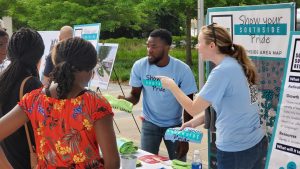2025 All-America City Finalist – Tallahassee, FL
In 2024, Tallahassee, Florida, celebrated its bicentennial, marking 200 years of growth from Native American and Spanish roots to becoming Florida’s capital and a thriving center of culture, education, and innovation. At the heart of its evolution is a strong, collaborative community spirit committed to progress.
Over the past decade, sustainable development has taken center stage. The city has prioritized green infrastructure, clean energy, and environmental stewardship to ensure resilience for the next 200 years. Initiatives like the Urban Forest Master Plan and Clean Energy Plan aim to preserve natural ecosystems, boost solar energy use, and strengthen infrastructure against increasing climate threats, including floods, tornadoes, and hurricanes.
Tallahassee’s strength lies in its partnerships. Nonprofits, universities, and businesses work alongside the city to expand affordable housing, improve public spaces, support the arts, and foster inclusive economic growth.
While challenges remain, Tallahassee remains focused forward, guided by inclusive planning and the dedication of its people.
Tallahassee’s Clean Energy Plan
The City of Tallahassee’s Clean Energy Plan (CEP), adopted in 2019, aims for 100% net clean renewable energy by 2050. Developed through extensive community input, the plan emphasizes sustainability, affordability, and grid resilience, especially for underserved communities. Key actions include expanding solar energy, implementing energy efficiency programs, and enhancing grid resilience with smart technologies and battery storage. Since its launch, solar capacity has tripled, and energy burdens for thousands of households have decreased. The city has also improved energy reliability, particularly during severe weather events.
 Community engagement has been central to the CEP’s success. The city hosted forums, conducted surveys, and formed stakeholder advisory groups involving local universities, businesses, and advocacy organizations. Over 2,400 residents participated in surveys, and more than 300 attended public sessions. Outreach to underserved communities included translated materials and tailored workshops to ensure equitable participation.
Community engagement has been central to the CEP’s success. The city hosted forums, conducted surveys, and formed stakeholder advisory groups involving local universities, businesses, and advocacy organizations. Over 2,400 residents participated in surveys, and more than 300 attended public sessions. Outreach to underserved communities included translated materials and tailored workshops to ensure equitable participation.
Tallahassee’s energy transition is supported by strong partnerships, including collaborations with Florida A&M University and Florida State University. The city’s efforts have earned a LEED Gold certification and strengthened public-private partnerships. With continued focus on renewable energy expansion and equitable access, Tallahassee is on track to achieve its 2050 goal, fostering a sustainable, inclusive future for all residents.
The Southside Action Plan
The Southside Action Plan (SAP), launched in 2021, addresses longstanding challenges in Tallahassee’s Southern Strategy Area, where decades-old policies failed to deliver results. To understand why, the city prioritized direct engagement with residents—attending community events, hosting drive-thru and pop-up engagements, and collecting feedback through surveys. This approach helped uncover current needs, build trust, and involve those often left out of planning processes.

Community leaders played a key role in encouraging participation, reinforcing the city’s commitment to inclusivity. Comparing past and present input revealed persistent concerns about housing, mobility, and infrastructure—raising important questions about implementation gaps. As a result, the SAP emphasizes community-led solutions and project accountability.
Since its adoption in 2023, the SAP has driven over $200 million in public investment toward infrastructure, housing, and neighborhood revitalization. Projects include the Southside Transit Center, safety improvements, and developments like Magnolia Oaks and Ridge Road Flats, which expand affordable housing options. From 2018–2023, more than 2,100 affordable units were added, along with new investments in rental rehabilitation, homebuyer assistance, and neighborhood services.
The SAP’s inclusive, data-informed approach earned the city a 2024 Award of Excellence from the Florida Chapter of the American Planning Association. Looking ahead, the plan will continue addressing resident priorities, from housing protections and job access to green infrastructure and safety enhancements.
100Parks
Access to quality parks and green spaces is crucial for community well-being, physical activity, and environmental sustainability. Tallahassee has prioritized equitable park distribution to ensure all neighborhoods, especially underserved ones, have safe and convenient access to public green spaces. Strategic investments in these areas have expanded recreational opportunities and fostered community connectivity.
 The city’s success has been driven by robust engagement, including public workshops, surveys, and partnerships with schools, nonprofits, and neighborhood associations. Volunteer programs, alongside youth and senior-specific initiatives, have promoted inclusion and local ownership. Neighborhood Park Advisory Committees offer ongoing feedback and advocacy.
The city’s success has been driven by robust engagement, including public workshops, surveys, and partnerships with schools, nonprofits, and neighborhood associations. Volunteer programs, alongside youth and senior-specific initiatives, have promoted inclusion and local ownership. Neighborhood Park Advisory Committees offer ongoing feedback and advocacy.
Through collaboration and strategic planning, the city reached its 2020–2024 Strategic Plan milestone of 100 parks, adding 12 new ones during that time. Geographic data helped prioritize development in underserved areas, such as the FAMU Way Dog Park on the Southside. Parks have been enhanced with upgraded facilities and amenities based on resident feedback, like converting tennis courts for pickleball use.
Sustainability and safety were also prioritized, with features like native landscaping, stormwater systems, and ADA-compliant walkways at parks like Bond Linear Park and Debbie Lightsey Nature Preserve. By 2023, 92% of residents lived within a 10-minute walk of a park, up from 80% in 2019. With ongoing projects, Tallahassee is committed to achieving 100% access, ensuring all residents benefit from these green spaces.
Some Related Posts
Thank You to Our Key Partners



